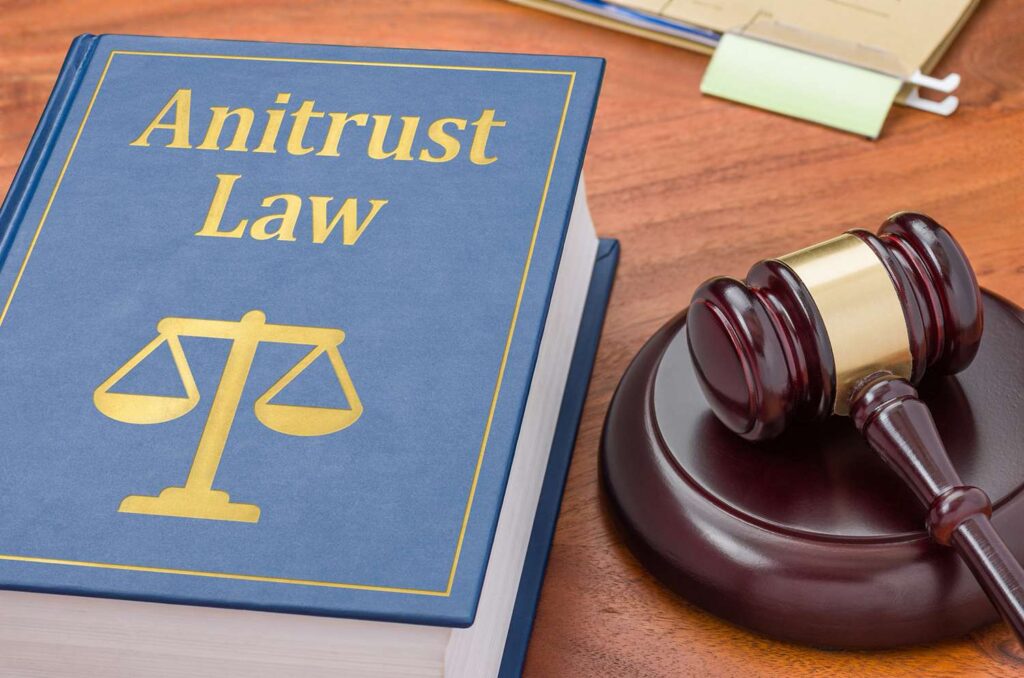What is an antitrust lawsuit? Competition benefits businesses and consumers. Antitrust laws seek to promote competitive markets. When companies violate antitrust laws, the price of goods and services surges, causing businesses and individuals to incur unnecessary expenses. Antitrust lawsuits are brought to challenge conduct, such as price fixing and monopolization, that has a harmful impact on competition.

Bid rigging is an illegal practice in which competitors conspire to raise prices in situations where purchasers acquire goods or services by soliciting competing bids. Competitors work together to submit overtly unacceptable bids to give the appearance that the winning bid was fair and reasonable. Examples include competitors forming a joint venture to submit a single bid or the winning bidder subcontracting to the losing bidder.
Market division schemes involve agreements among competitors to divide up specific customers, products, or territories.
Monopolization occurs when one company intentionally destroys its rivals to obtain control over a particular good or service by raising prices or reducing supply.
Price fixing is an agreement among competitors to raise or maintain prices of goods or services and can include changing the terms of discount programs, warranties, shipping fees, or financing rates.
Antitrust law is a collection of federal and state laws that regulate the conduct and organization of corporations to promote competition for the benefit of consumers.
The Sherman Act prohibits “unreasonable” business activities that restrain competition. It provides both civil and criminal remedies for antitrust violations, including conspiracies to restrain trade, conspiracy to monopolize, and monopolization.
The Clayton Act bans certain conduct that could create a monopoly, such as mergers and acquisitions, that give one company exclusive control of a product or supply chain. The act provides for civil remedies and grants the courts the proactive power to enjoin anti-competitive conduct before it causes harm.
The Federal Trade Commission Act is enforced by the Federal Trade Commission and bans “unfair methods of competition” and “unfair or deceptive acts or practices,” including anti-competitive behavior that may not be challengeable under the Sherman Act.
Many states have antitrust laws to govern commerce occurring within their state borders. Sometimes, state antitrust laws are more expansive than the federal antitrust laws in terms of the amount and quality of prohibited conduct. In California, we have the California Cartwright Act, which prohibits antitrust competitive actions by companies operating in California, and the California Unfair Practices Act, which prohibits illegal price discrimination in California.
Antitrust lawsuits can be brought by an individual or a business against the offending company. In cases where the loss to each individual or business is small, those harmed can join together to being a class action. This allows individuals and businesses to pool their resources and leverage their claims to ensure a company takes notice.
Businesses and consumers harmed by antitrust violations turn to JF Esq & Associates’s skilled and aggressive antitrust attorneys to challenge the anticompetitive conduct and ensure that prices reflect fair competition in a free-market economy.
What does it cost to bring an antitrust class action? Nothing. JF Esq & Associates represents businesses and individuals on a contingency fee basis, meaning we advance all attorneys’ fees and expenses incurred by the litigation. If we are successful in litigation, we will seek to have the court approve our fee request, which will be paid out of the recovery for the class. We never seek reimbursement for attorneys’ fees or costs directly from our clients
If you believe you have been injured due to antitrust violations by a company or if you would like more information about our antitrust practice, please contact our antitrust class action attorneys at phone number
© 2024 JF Esq & Associates. All Rights Reserved